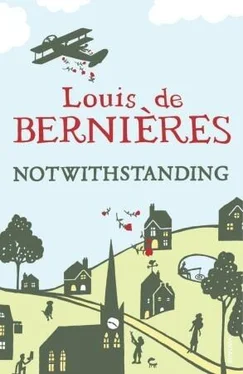Louis de Bernieres - Notwithstanding - Stories from an English Village
Здесь есть возможность читать онлайн «Louis de Bernieres - Notwithstanding - Stories from an English Village» весь текст электронной книги совершенно бесплатно (целиком полную версию без сокращений). В некоторых случаях можно слушать аудио, скачать через торрент в формате fb2 и присутствует краткое содержание. Год выпуска: 2010, Издательство: Vintage, Жанр: Современная проза, на английском языке. Описание произведения, (предисловие) а так же отзывы посетителей доступны на портале библиотеки ЛибКат.
- Название:Notwithstanding: Stories from an English Village
- Автор:
- Издательство:Vintage
- Жанр:
- Год:2010
- ISBN:нет данных
- Рейтинг книги:4 / 5. Голосов: 1
-
Избранное:Добавить в избранное
- Отзывы:
-
Ваша оценка:
- 80
- 1
- 2
- 3
- 4
- 5
Notwithstanding: Stories from an English Village: краткое содержание, описание и аннотация
Предлагаем к чтению аннотацию, описание, краткое содержание или предисловие (зависит от того, что написал сам автор книги «Notwithstanding: Stories from an English Village»). Если вы не нашли необходимую информацию о книге — напишите в комментариях, мы постараемся отыскать её.
is a funny and moving depiction of a charming vanished England.
Notwithstanding: Stories from an English Village — читать онлайн бесплатно полную книгу (весь текст) целиком
Ниже представлен текст книги, разбитый по страницам. Система сохранения места последней прочитанной страницы, позволяет с удобством читать онлайн бесплатно книгу «Notwithstanding: Stories from an English Village», без необходимости каждый раз заново искать на чём Вы остановились. Поставьте закладку, и сможете в любой момент перейти на страницу, на которой закончили чтение.
Интервал:
Закладка:
In the car, on the way to hospital, Mrs Barkwell reflected that there would not have been room for all of them anyway, and she hoped that the Major and Joan would be all right. ‘Damn them both,’ exclaimed the Colonel fiercely, and no more was said on the subject as he drove, in the grip of an ecstatic rage, pell-mell through the sinuous country lanes towards the little casualty unit at Haslemere hospital. The other four did not know whether they felt sick from the salmon, or from the terrifying and vertiginous speed of their journey, or from being crammed together like dates in a box, or from retrospective horror at the viciousness of the quarrel that they had just witnessed. They were flung against each other unmercifully as the old Rover skidded and screeched around the corners, and the Rector prayed aloud, his left upper arm forced against the copious but unmaternal bosom of the resolute Polly Wantage, whose overpowering aroma of wet tweed, dogs and bitter pipe dottle contributed generously to the general feeling of sickness and nausea experienced by all the passengers in the bucketing car. Polly’s companion whimpered softly to herself, and Leafy Barkwell, white-faced in the front seat, closed her eyes and tried not to think. She realised suddenly that they had forgotten poor Nanna altogether, and that Nanna had also eaten the salmon, but somehow she lacked the will to tell the Colonel to turn back for her. A wave of unhappy fatalism overcame her, and she decided to try not to think about what it would be like to die by overleaping a ditch and crashing into an oak tree.
When the car left the twisting lane and reached the main road from Brook to Haslemere, everyone felt relief tempered by the knowledge that the Colonel’s wrathful driving could still easily leave them dead. Polly Wantage realised she was longing to know about the origins of the ‘sheepshagger’ jibe, but even that formidable lady baulked at the idea of raising the subject when the Colonel was still in an incendiary state of vexation. She would keep a straight bat on this exceedingly sticky wicket, and hope that it would see her through. Certainly she had not felt such trepidation since she had faced the fast bowling of Tricky Trent-Donovan in that memorable match in which she had almost been caught in the slips for a duck before going on to get fifty-six not out.
At last the Rover slewed to a halt in the hospital car park, and its occupants staggered out, bewildered, sick, but relieved to be alive. The Colonel corralled them together and shushed them towards casualty like particularly troublesome sheep. ‘Get a move on, that man,’ he said curtly to his wife, and ‘Jump to it’ to the Rector.
It was not a busy night in Haslemere hospital, and in the waiting room there was only a doleful man with a fish hook embedded in his forefinger and a diminutive nun from the hilltop convent in Notwithstanding, who was suffering from superficial abrasions because she had been dragged a short way along the lane when her habit had caught in the door of Sister Concepta’s minivan. The Colonel’s party was met by a small, plump Asian doctor, who came from behind the partitions and wished them ‘Jolly good evening’.
‘Bloody awful evening,’ riposted the Colonel, who then pointed his finger at his unfortunate knot of dinner guests. ‘Food poisoning. Stomach pump,’ he declared. ‘Chop-chop.’
The doctor bridled; he had always resented the way in which a certain kind of person tried to push him around as if he were a mere orderly. Knowing that the stomach pump was invariably unpleasant and humiliating and could even be painful if passed down the gullet with sufficient lack of sympathy, he squared his shoulders, looked the Colonel in the eye, and said firmly, ‘Very good, sir. You first.’
* * *
It was an hour and a half before Colonel Perry Barkwell and Leafy returned to their house, pale and weakened after their ordeal, crushed and tired beyond all reckoning, almost too overwhelmed by the awfulness to be able to speak to each other. Leafy Barkwell was sure that never again would they be able to give another dinner party, and the Colonel could still feel the pain of the prolonged and energetic sluicing that his guts had had to endure. He felt unsteady on his feet, and all his imperial bravado had vanished. He leaned on his wife’s shoulder for support and wiped his white moustache repeatedly with a monogrammed handkerchief, repeating, ‘Oh God, oh God.’
The pallid couple were met in the hallway by Nanna, who was clearly perfectly well, albeit still tearful about the untimely demise of the misadventurous Troodos. ‘Oh Nanna,’ exclaimed Mrs Barkwell, her voice trembling with horror, ‘it was simply dreadful.’
Nanna held out her hand, in which she was holding a small piece of paper. ‘ Der Kater ,’ she said. ‘ Eine Nachricht .’
Mrs Barkwell took the note and eased herself wearily down on to the chair beside the hall chest. She began to read it, and then said, ‘Oh God, oh my God, oh God …’ She looked up at her much-diminished husband, who was holding himself upright by clutching on to the banister ball that Nanna loved so much to polish. ‘It’s about the cat,’ she said. ‘It’s from Totty Banks.’
The Colonel took the message and read the first lines. ‘“Dear Leafy and Perry, I am so dreadfully sorry about poor Troodos. I do believe that I was almost as fond of him as you were …”’ The Colonel raised his eyebrows. ‘Damned curious,’ he said. ‘Letter of condolence already. Rum do.’
‘Read the rest of it,’ said Mrs Barkwell softly, and the Colonel continued, reading aloud, ‘“He was a very great character, a real personality in the village, and, if it wasn’t an insult to such a fine cat, I would have said that he was almost human.”
‘Quite. Quite,’ agreed the Colonel, and then he continued once more. ‘“I dearly wish that I could turn the clock back, believe me, and I am so desperately sorry that I could do nothing about it. I suppose that Troodos was crossing over into the field to look for voles. I do hope that you will be able to forgive me, but I just didn’t see him at all until the last minute, when it was too late to swerve …”’
ALL MY EVERLASTING LOVE

HE SPENT THE morning shooting at daffodils with his air rifle. To be more exact, he was trying to shoot through the stalks so that they keeled over. He would not have tried shooting through the flower heads, since he was not insensitive to their beauty, and, in any case, that would have wrecked his mission. His mother Joan had sent him out to pick daffodils for a dinner party that she was having in the evening.
When she had asked him, he had grimaced and his heart had sunk. This was a girl’s job. His jobs were to empty the waste-paper baskets and burn the rubbish, chop wood, prune the fruit trees, rescue birds and mice from the cats, walk the dog, scoop up pet vomit, dig trenches, cut the hedge, go up ladders to clean out the gutters and roam around the countryside with his catapult and air rifle. The only girl’s task he ever did was to make the coffee after supper. His sisters had to clean and tidy inside the house, activities from which he was exempt, apart from emergencies that required the use of the Hoover. His father washed up after supper and also hoovered in emergencies. It was an enlightened household, in which it seemed as though the women did all the work, but in which anything very unpleasant or strenuous always fell to the men.
Peter would not have had it any other way. He had just turned thirteen and had only recently left behind his shorts and become eligible for jeans. He loved his jeans, as the whole country loved jeans. They were the epitome of comfort and modernity, without being either modern or comfortable. It was the late sixties; disreputable people had taken to wearing them. They were raffish and daring and they proclaimed the beginning of a more casual age, when the platoons of commuters walking to the station suddenly gave up wearing bowler hats. Even his father, the Major, had taken to wearing jeans at weekends, and even the Major’s hair had become fractionally longer owing to the subversive influence of the Beatles and the Rolling Stones. The Major and Joan disapproved strongly of the Beatles and the Stones, even though they had once had a soft spot for Elvis, and so it had been Granny who had taken all the children to see Help! and A Hard Day’s Night . Granny thought that George and Paul were sweet. The Major used to say that those bloody pop stars (who couldn’t even sing, with or without a fake American accent) should serve some time in the forces; that would straighten their ideas out. It was discipline they were short of. What he really wanted was to tie them down, gag them, cut their hair off and then shoot the lot of them, along with George Brown and Harold Wilson. But his hair became longer nonetheless. One day, perhaps five years hence, he would even sport sideburns in the wake of his wife’s crush on Engelbert Humperdinck, and he would wear, briefly, a kipper tie with paisley swirls. But he would never sink so low as to wear brown shoes with a black suit.
Читать дальшеИнтервал:
Закладка:
Похожие книги на «Notwithstanding: Stories from an English Village»
Представляем Вашему вниманию похожие книги на «Notwithstanding: Stories from an English Village» списком для выбора. Мы отобрали схожую по названию и смыслу литературу в надежде предоставить читателям больше вариантов отыскать новые, интересные, ещё непрочитанные произведения.
Обсуждение, отзывы о книге «Notwithstanding: Stories from an English Village» и просто собственные мнения читателей. Оставьте ваши комментарии, напишите, что Вы думаете о произведении, его смысле или главных героях. Укажите что конкретно понравилось, а что нет, и почему Вы так считаете.












